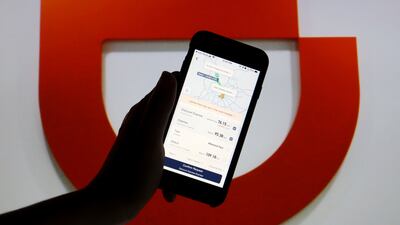China's biggest ride-hailing company Didi said on Sunday that the removal of its DiDi Chuxing app from smartphone app stores in China is expected to have an adverse effect on its revenue.
Earlier on Sunday, China's cyber space regulator ordered app stores to stop offering Didi's app after finding that the company had illegally collected users' personal data.
The removal of Didi's app, which does not affect existing users, comes days after Didi made its trading debut on the New York Stock Exchange in an initial public offering that raised $4.4 billion.
In a June filing, Didi reported revenue of about 42.2bn yuan ($6.5bn) for the three months ended March 31. Of that, 39.2bn yuan came from its China mobility division while about 800 million yuan came from its international business.
Didi has a dominant position in the online ride-hailing business in China and operates at 4,000 locations across 16 countries.
Didi said it will strive to rectify any problems, and will protect users' privacy and data security.
Since late last year, Chinese internet regulators have cracked down more sharply on the country's technology companies for breaching the rules.
The Global Times, a tabloid published by the ruling Communist Party's official People's Daily newspaper, said in a Chinese-language commentary on Monday that Didi's apparent "big data analysis" capability could pose risks to the security of personal information.
"No internet giant can be allowed to become a super database of Chinese people's personal information that contains more details than the country, and these companies cannot be allowed to use the data however they want," the Global Times said.
Didi gathers vast amounts of real-time mobility data everyday. It uses some of the data for self-driving technology and traffic analysis.
In its IPO prospectus, Didi said "we follow strict procedures in collecting, transmitting, storing and using user data pursuant to our data security and privacy policies."
A senior Didi executive said on Saturday that the company stores all China user and road data at servers in the country and it is "absolutely not possible" that it passed data to the US.

